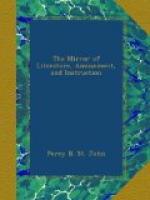“Whenever an American requests to see me (which is not unfrequently) I comply, firstly, because I respect a people who acquired their freedom by their firmness without excess; and, secondly, because these Trans-Atlantic visits, ‘few and-far between’ make me feel as if talking with posterity from the other side of the Styx. In a century or two, the new English and Spanish Atlantides will be masters of the old countries, in all probability, as Greece and Europe overcame their mother Asia in the older or earlier ages, as they are called.”
EXTRACT FROM A DIARY OF LORD BYRON, 1821.
“Ravenna, January 12th, 1821.
“I have found out the seal cut on Murray’s letter. It is meant for Walter Scott—or Sir Walter—he is the first poet knighted since Sir Richard Blackmore. But it does not do him justice. Scott’s—particularly when he recites—–is a very intelligent countenance, and this seal says nothing.
“Scott is certainly the most wonderful writer of the day. His novels are a new literature in themselves, and his poetry as good as any—if not better (only on an erroneous system)—and only ceased to be so popular, because the vulgar learned were tired of hearing ‘Aristides called the Just,’ and Scott the Best, and ostracised him.
“I like him, too, for his manliness of character, for the extreme pleasantness of his conversation, and his good-nature towards myself, personally. May he prosper!—for he deserves it. I know no reading to which I fall with such alacrity as a work of W. Scott’s. I shall give the seal, with his bust on it, to Madame la Contesse G. this evening, who will be curious to have the effigies of a man so celebrated.
“January 20th, 1821.
“To-morrow is my birthday—that is to say, at twelve o’ the clock, midnight, i.e. in twelve minutes, I shall have completed thirty and three years of age!!!—and I go to my bed with a heaviness of heart at having lived so long, and to so little purpose.
“It is three minutes past twelve.—’’Tis the middle of night by the castle clock, and I am now thirty-three!
’Eheu, fugaces, Posthume, Posthume,
Labuntur anni;—’
but I don’t regret them so much for what I have done, as for what I might have done.
“Through life’s road, so dim and dirty,
I have dragg’d to three-and-thirty.
What have these years left to me?
Nothing—except thirty-three.
“January 22nd, 1821.
1821.
Here lies
interred in the Eternity
of the Past,
from whence there is no
Resurrection
for the Days—whatever there may be
for the Dust—
the Thirty-Third Year
of an ill-spent Life,
Which, after
a lingering disease of many months,
sunk into a lethargy,
and expired,
January 22nd, 1821, A.D.
Leaving a successor
Inconsolable
for the very loss which
occasioned its
Existence.”




